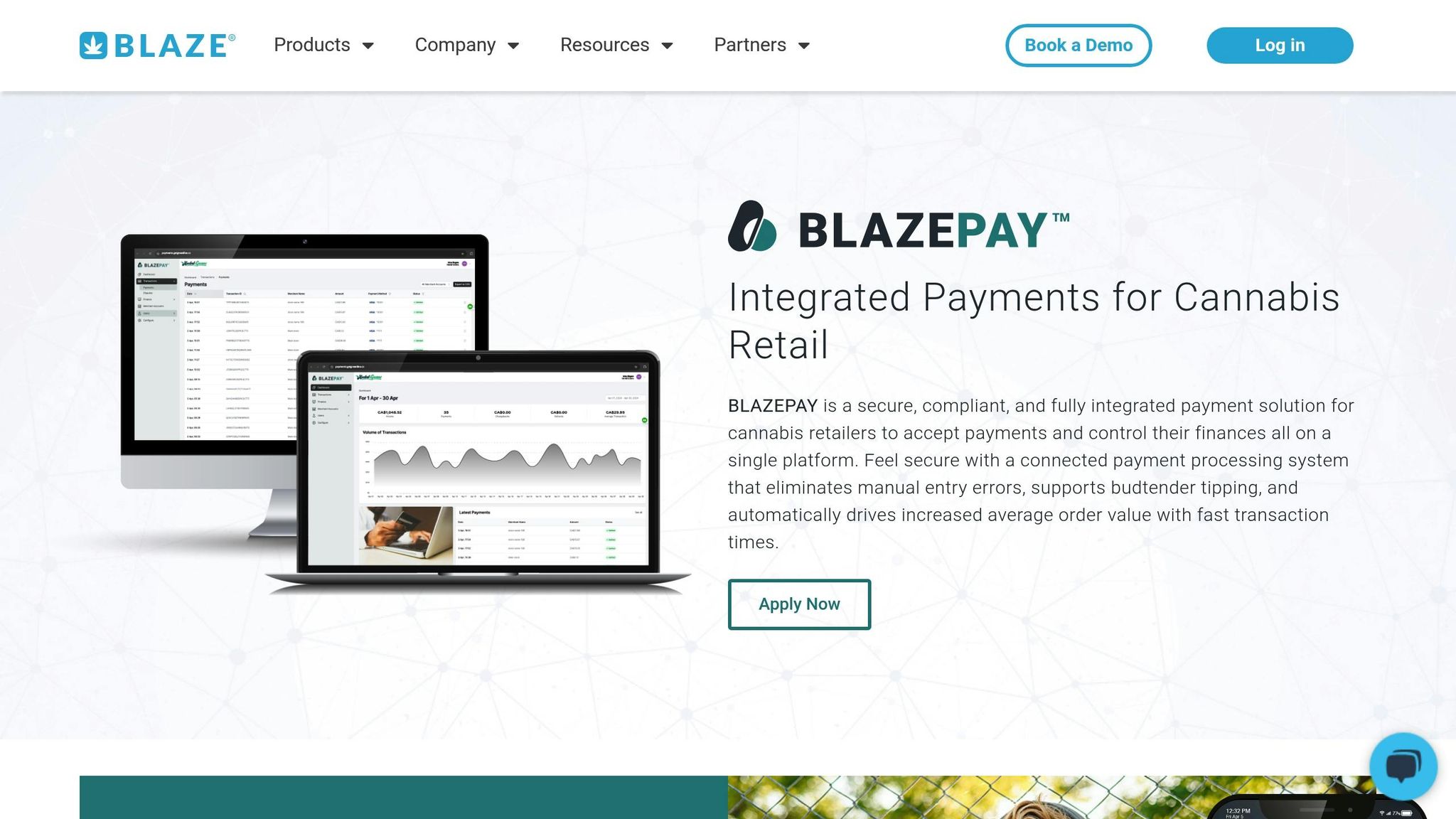Struggling with cannabis payment processing? Here's what you need to know:
The cannabis industry faces unique challenges with payments due to federal restrictions and limited banking access. Choosing the right payment processor is critical for compliance, security, and growth. Here's a quick breakdown of what to look for:
- Legal Compliance: Ensure the processor adheres to federal and state laws, including FinCEN guidelines and the Bank Secrecy Act.
- Security Features: Look for PCI DSS compliance, encryption, fraud detection, and regular security audits.
- Fee Transparency: Understand fees like processing rates (3.7%-6%), transaction fees ($0.20-$0.50), and monthly charges ($50-$200).
- System Reliability: Opt for processors with 99.9% uptime, 24/7 monitoring, and backup systems.
- POS Compatibility: Ensure integration with your current POS system, including in-store and online transactions.
Why it matters: Without reliable payment solutions, cannabis businesses risk operational issues, legal trouble, and lost revenue. Start by researching processors with a proven track record in the industry, transparent banking relationships, and robust support services.
Pro Tip: A dependable payment processor can increase average cart sizes by 30% and reduce cash handling risks.
Now, let’s dive deeper into how to make the best choice.
BLAZEPAY® Pin Debit for Cannabis Retailers

Common Payment Processing Issues in Cannabis
Navigating payment processing in the cannabis industry is no easy task, thanks to a maze of federal and state regulations. With U.S. cannabis sales expected to hit $42.98 billion by 2024, these challenges aren't just theoretical - they're impacting real businesses every day.
Federal and State Law Requirements
Federal anti-money laundering and bank secrecy laws create a tough compliance landscape. Even though recreational cannabis is now legal in 25 states as of 2023, federal law still classifies cannabis as illegal. This classification prevents major credit card networks like Visa, Mastercard, Discover, and American Express from processing cannabis-related transactions.
"Despite the continuous developments in the legalization of cannabis at the state level, banks remain wary of being called 'weed banks' and the attached stigma of dealing with cannabis - making cannabis banking still a struggle for many business owners." - Ian Sells, CEO of Million Dollar Sellers
Risk Management for Cannabis Payments
Cannabis businesses are often labeled "high-risk", and this designation comes with a host of challenges:
- Higher Processing Fees: Banks impose premium rates due to perceived risks.
- Strict Monitoring: Transactions face heightened scrutiny.
- Limited Service Options: Fewer payment processing solutions are available.
- Increased Compliance Costs: Businesses must handle extra reporting and documentation.
These hurdles can disrupt day-to-day operations. To address them, businesses need strong Know Your Customer (KYC) protocols and meticulous compliance records.
On top of these risks, limited access to banking further complicates payment processing.
Limited Banking Access
Without access to traditional banking, many cannabis businesses are forced to operate heavily in cash, which poses its own set of security and operational issues.
"Digital and cashless payment methods would have significantly helped cannabis businesses monitor cash flow and accounting transactions, improve business safety, make tax payments easier, and improve customer transactions." - Gerald Lombardo, Head of Growth at Popl
The SAFER Banking Act, currently under review, could significantly expand financial service access if passed. Until then, cannabis businesses must work within a limited framework while staying compliant with both state and federal laws.
In short, federal restrictions, high-risk classifications, and restricted banking access make payment processing in the cannabis industry a challenging puzzle. Specialized solutions aren't just helpful - they're critical for businesses looking to thrive in this space.
What to Look for in a Payment Processor
Legal Compliance Standards
Your payment processor must be well-versed in federal regulations such as the Cole Amendment, FinCEN guidelines, the Bank Secrecy Act (BSA), and Department of Justice (DOJ) requirements. Make sure they avoid using misleading merchant codes, as this can lead to serious legal issues and even account termination.
Data Security Requirements
Strong security measures are non-negotiable. Look for processors offering:
- PCI DSS compliance certification to ensure secure handling of cardholder data
- End-to-end encryption to protect transactions
- Multi-factor authentication for account access
- Real-time fraud detection systems to prevent unauthorized activity
- Regular security audits and penetration testing to identify vulnerabilities
Fee Structure and Contract Terms
Understanding the full fee structure helps you manage costs effectively. Here's what you can typically expect:
| Fee Type | Typical Range | Notes |
|---|---|---|
| Processing Rate | 3.7% - 6% | Depends on transaction volume |
| Per-Transaction Fee | $0.20 - $0.50 | Impacts small purchase profitability |
| Monthly Service | $50 - $200 | Often includes customer support services |
| Onboarding | $100 - $350 | One-time setup fee |
Don't just focus on the processing rate. Consider how per-transaction fees and other charges fit into your overall sales volume and average transaction size.
System Reliability Measures
A reliable payment processor should provide:
- 99.9% uptime to minimize disruptions
- 24/7 system monitoring for quick issue resolution
- Backup processing capabilities to handle outages
- Automated failover systems for seamless transitions
- Real-time transaction monitoring for accurate tracking
POS System Compatibility
Your payment processor should work effortlessly with your current Point of Sale (POS) system. Key features to check include:
- API availability for custom integrations
- Support for major cannabis POS platforms
- Handling both in-store and online transactions
- Real-time inventory synchronization to keep stock accurate
- Automated compliance reporting to meet legal requirements
Additionally, confirm whether the processor requires a reserve. This could range from as low as 1% with a three-month rolling reserve to as high as 10% with a six-month reserve. This detail can directly impact your working capital and cash flow. These factors will help you choose a processor that aligns with your business needs.
sbb-itb-72191b9
How to Select a Payment Processor
Check Company History
Start by looking into the processor's track record in the cannabis industry. Key factors to check include their processing volume, the number of active merchants they serve, and how long they've been operating in this high-risk sector. A stable processor is essential to keep your business running smoothly.
It's also important to choose a processor that maintains open and transparent relationships with its banking partners. This transparency is a good sign of legitimacy and adherence to federal regulations. Make sure the processor complies with all legal requirements before moving forward.
Confirm Legal Requirements
Ensuring legal compliance is a must. Here's how to verify it:
-
Review Key Documents
Check critical compliance paperwork, such as:- Cannabis processing licenses specific to your state
- FinCEN registration status
- BSA/AML compliance programs
- Proof of banking partnerships
-
Understand Regulatory Compliance
"Your payment processor should have a system in place that is compliant with all federal, state, and local laws regarding the cannabis industry. Companies must understand and adapt to varying regulations."
Review Support Services
Once you're confident in the processor's history and legal standing, evaluate their support services. These will directly impact your daily operations. Consider the following:
| Support Feature | What to Verify |
|---|---|
| Response Time | How quickly they resolve urgent issues |
| Coverage Hours | Whether they're available 24/7 for critical needs |
| Support Channels | Availability of phone, email, and chat support |
| Technical Expertise | Access to specialists with cannabis industry knowledge |
| Emergency Protocol | Backup systems for uninterrupted processing |
Check Financial Stability
Finally, assess the processor's financial health. Confirm their banking relationships, ability to handle transaction reporting, and capacity to manage your current and future processing needs. Ask for sample transaction reports to ensure they provide clear and accurate traceability for compliance purposes.
Managing Your Payment System
For cannabis businesses, having a well-organized payment system is just as important as picking a dependable processor.
Staff Training Requirements
Proper training is key to keeping payment operations running smoothly. Create clear SOPs (Standard Operating Procedures) and provide role-specific training that covers the following:
| Training Component | Key Focus Areas |
|---|---|
| System Operations | Setting up payment software, handling hardware, and processing transactions |
| Compliance Rules | Cash handling, meeting regulations, and following reporting protocols |
| Security Measures | Detecting counterfeit bills, verifying IDs, and preventing fraud |
| Error Resolution | Resolving transaction disputes, troubleshooting system issues, and escalating support needs |
Use built-in training tools to keep your team updated and ensure they’re confident with the system.
Payment Record Management
To stay compliant and efficient, standardize how you monitor transactions and manage cash:
- Audit cash drawers regularly and match them with POS reports.
- Install security systems to oversee cash handling.
- Use TL-30 rated safes and ID verification scanners for added security.
- Train staff to spot counterfeit bills and follow proper cash handling protocols.
These practices not only streamline operations but also help you meet regulatory requirements.
Compliance Updates
Staying on top of regulatory changes is a must. For instance, ACH payments can increase customer spending by 25% while cutting cash handling costs by 4% to 15%. Keeping your payment system compliant ensures smoother operations and fewer headaches.
Growth Planning
As your business grows, your payment system should grow with it. Scalable systems can handle higher transaction volumes without hiccups. Integrating ACH payments can also improve efficiency and lower costs. Regularly auditing your system will help you spot and fix issues before they become problems.
Conclusion
Choosing the right payment processor is crucial for navigating the complex landscape of compliance, security, and reliability in the cannabis industry. With the U.S. legal cannabis market hitting $25 billion in 2021 and expected to surpass $35 billion by 2023, the stakes are high for making an informed decision.
Legal compliance should be your top priority. Your payment processor needs a solid grasp of federal and state regulations, including the Cole Amendment, FinCEN guidelines, and BSA requirements. Without this, your business could face serious legal challenges.
Security is another key factor. In 2015, half of marijuana dispensaries faced burglary or robbery attempts. Look for processors that offer strong fraud protection, clear reporting, and a commitment to transparency. These features help protect your business and build trust with your customers.
Reliability is just as critical. Businesses that don’t accept card payments risk losing millions of customers annually. Plus, customers typically spend up to 30% more when using cards instead of cash. A dependable system ensures you won’t miss out on these opportunities.
As Keira Payment Systems highlights:
"By offering 100% transparency to our processing banks, our clients just work their businesses and don't have to worry about interruptions or headaches. We got this." - Keira Payment Systems
Finally, with limited banking options in the cannabis industry, it’s essential to partner with a processor that has strong relationships with cannabis-friendly banks. This ensures smoother operations and fewer disruptions for your business.


